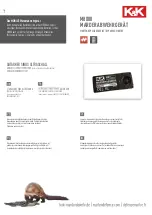
11
Rev. (30-JAN-98) • RLM v4.7
© 1995-98 Automated Logic Corporation
7.
Transfer parameters to this FB.
8.
To activate these tables enter the gain of the
translation table used (either 15.00 or 15.06) on the
FB parameter pages that contain the input for which
the table applies. Set the offset to 0.00.
NOTES:
1.
The minimum resistance for a setpoint adjust input
on the Enhance Zone Sensor port must be equal to
4.7k Ohms. The minimum range for the slidepot on
the setpoint adjust input must be equal to 5k Ohms.
2.
The setpoint input bias parameter for slidepots is
only applicable if the slidepot is connected to the
setpoint adjust input (pin 3 on the Enhance Zone
Sensor, channel 3A.
3.
The setpoint input bias parameter for slidepots is
only applicable if the slidepot is connected to the
sepoint adjust input (pins 3 and 1 on the enhanced
sensor connection, channel 3A).
Analog Outputs
The R683 module has three analog outputs. These
outputs may be used in the following modes:
Voltage Mode (0-10 VDC):
1k Ohm minimum load
impedance.
Current Mode (4-20 mA):
Although the R683's analog
outputs were designed to output voltage, it is possible to
use these outputs for current mode devices. To do this,
wire a 1/2 Watt resistor in series with the resistive load,
(as shown in Figure 12). The value of the series resistor is
determined as follows:
R
SERIES
= 500 Ohms - R
LOAD
Example: To drive a 100 Ohm resistive load with a
0-20 mA signal, subtract the load resistance from 500
Ohms:
R
SERIES
= 500 Ohms - R
LOAD
= 500 Ohms - 100 Ohms
= 400 Ohms
This example is shown in Figure 12.
Procedure
1.
Turn the R683's power switch OFF.
2.
Terminate the output wiring to the top termination
strip as shown in Figure 12.
3.
Turn the R683's power switch ON.
Digital Outputs
The R683 has six digital outputs which can be connected
to a maximum of 24 Volts AC/DC (see Figures 12). The
digital outputs can be configured as dry contact
(normally open) with a contact rating of 3 A (maximum).
Procedure
1.
Turn the R683's power switch OFF.
2.
Terminate the output wiring to the top termination
strip as shown in Figures 12.
NOTE: Pilot relays should not be powered from the
same transformer which powers the R683.
3.
Turn the R683's power switch ON.
By setting the HOA switches (see Figure 1), each digital
output can be placed in ON, OFF, or AUTO mode. The
position of the HOA switches may be monitored through
channels 81-86. Channel 81 corresponds to channel 11,
channel 82 to channel 12, etc. A status of OFF on these
channels indicates the switch is set to AUTO mode. A
status of ON indicates the switch is set to either ON or
OFF mode.
Checkout & Troubleshooting
Checkout is performed using either the Workstation or a
portable computer that is direct-network connected to the
module. To use a portable computer, connect an NI485N
cable to the “ACCESS” connector, located in the lower
right corner of the module (see Figure 10).
NOTE: Do NOT separate the NI485N cable adapter with
the LED on it from the rest of the cable. This adapter
contains circuitry essential for proper communication.
Check each input by manually causing each sensor to
establish a known condition and then comparing it to the
condition reported on the FB's status page.
Check each output by locking it to a known condition on
the FB's parameter page and then observing that
equipment's operation.


































